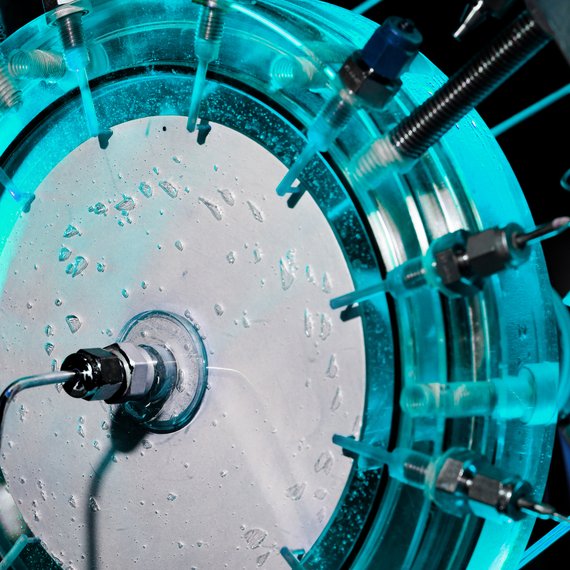Date
Friday May 26, 2023 from 12:00 PM to 1:00 PMLocation
Online | MS TeamsPrice
Free
Welcome & join us !
You are warmly invited to join our next online (43rd) EIRES Lunch lecture which is scheduled as follows:
Date
Friday 26 May 2023
Time
12h00 - 13h00 CET
Topic
Towards Sustainable and Circular Batteries – Unravelling Dynamic Processes via Operando X-ray Absorption Spectroscopy
Speaker
Prof. Dr. Moniek Tromp
University of Groningen - Faculty of Science and Engineering
Zernike Institute for Advanced Materials - Materials Chemistry
Full program
Download the invitation including detailed program
Introduction
An important element in the reduction of CO2 is the change of vehicles with internal combustion engines to electric battery powered vehicles. The as such produced renewable energy can be used for individual mobility as well as for a temporary intermediate storage of excess energy. A viable electric mobility concept requires however stable cycle batteries with high specific energy (minimising weight, maximising driving range).
Li ion batteries are widely used in applications such as mobile phones and laptops, and will likely be key to future electromobility. Alternative, more sustainable batteries are essential to enable the significant increase in demand as well as their differing applications and requirements (incl. local and grid storage), while reducing pressure on climate and environment.
ational design of novel battery chemistries and technologies requires a detailed understanding of the charge, discharge and deactivation mechanisms, preferably quantitative and spatially resolved. X-ray absorption spectroscopy (XAS) is a characterisation technique which provides detailed electronic and structural information on the material under investigation, in a time- and spatially resolved manner. X-ray Absorption Spectroscopy (XAS) allow these spectro-electrochemical investigations, providing insights in the type, location and reversibility of the intermediates formed in and on electrodes and electrolyte separately. Obtained insights in cycling and deactiviation mechanisms for different battery types will be discussed and future research directions towards more stable and sustainable batteries described.
About the speaker
Moniek Tromp finished her MSc in Chemistry, with specialisations in spectroscopy and catalysis, at the University of Utrecht (Nld) in 2000. She then obtained a PhD from the same university, in the fields of homogeneous catalysis and time-resolved X-ray absorption spectroscopy with Profs. Koningsberger and van Koten. After finishing with distinction (‘cum laude’, greatest honours possible) in 2004, she moved to the University of Southampton (UK) for a Post-Doctoral Research fellowship in the fields of heterogeneous catalysis and spectroscopy. In 2007, she was awarded an EPSRC Advanced Research Fellowship to start her own independent academic career (and became lecturer). She moved to Germany in 2010, where she took up a position as professor in Catalyst Characterisation at the Technical University Munich. In 2014, she decided to come back to the Netherlands, working at the University of Amsterdam. From July 2018 she has taken up the Chair of Materials Chemistry at the Zernike Institute at the University of Groningen. From January 2023 she is the research director of the Zernike Institute for Advanced Materials.
She has been awarded prestigious fellowships/awards like the EPSRC Advanced Research Fellowship, NWO VIDI and the NWO Athena prize. She is active in numerous science advisory and review panels of large research facilities and universities internationally, part of a European Science Strategy team for large facilities, and has published over 100 papers in high profile journals and given over 80 invited lectures worldwide.
She is chair of the Dutch Catalysis Society (of the KNCV), board member of the National Network for Female Professors (LNVH), was board member of the Dutch Science Foundation NWO (division ENW). At a European level she is chair of the Young Academy Europe and the Young Academies Science Advice Structure.
Her research focusses on the development and application of operando spectroscopy techniques in catalysis and materials research, incl. fuel cells, batteries, photochemistry, as well as arts, with a focus on X-ray spectroscopy techniques. Novel (time resolved) X-ray absorption and emission spectroscopy methods have been developed as tools in catalysis and energy material (battery and fuel cell) research. This includes the development of the required operando instrumentation and cells, as well as data analysis and theoretical methods. Application of the techniques to fundamentally or industrially interesting catalytic processes and materials has been pursued, providing unprecedented insights in properties and mechanisms.
Organized by
EIRES | Focus Area - Chemistry for Sustainable Energy Systems
Led by Principal Scientists
Marta Costa Figueiro - Adriana Creatore
Format
Online | MS teams
Speaker & Organizers
AUDIENCE
EIRES Lunch lectures are open for anyone interested in the latest developments in energy storage and conversion. Different keynote speakers from academia and industry will present their views, solutions and outlooks on the topic. The lectures leave plenty of room for discussion. We value your input. Looking forward meeting you!
Queries & tips?
Let us know: eires@tue.nl
Follow us & connect
- LinkedIN and stay updated
- Twitter and discuss with us
- Visit EIRES and learn more
- Watch EIRES and get inspired
